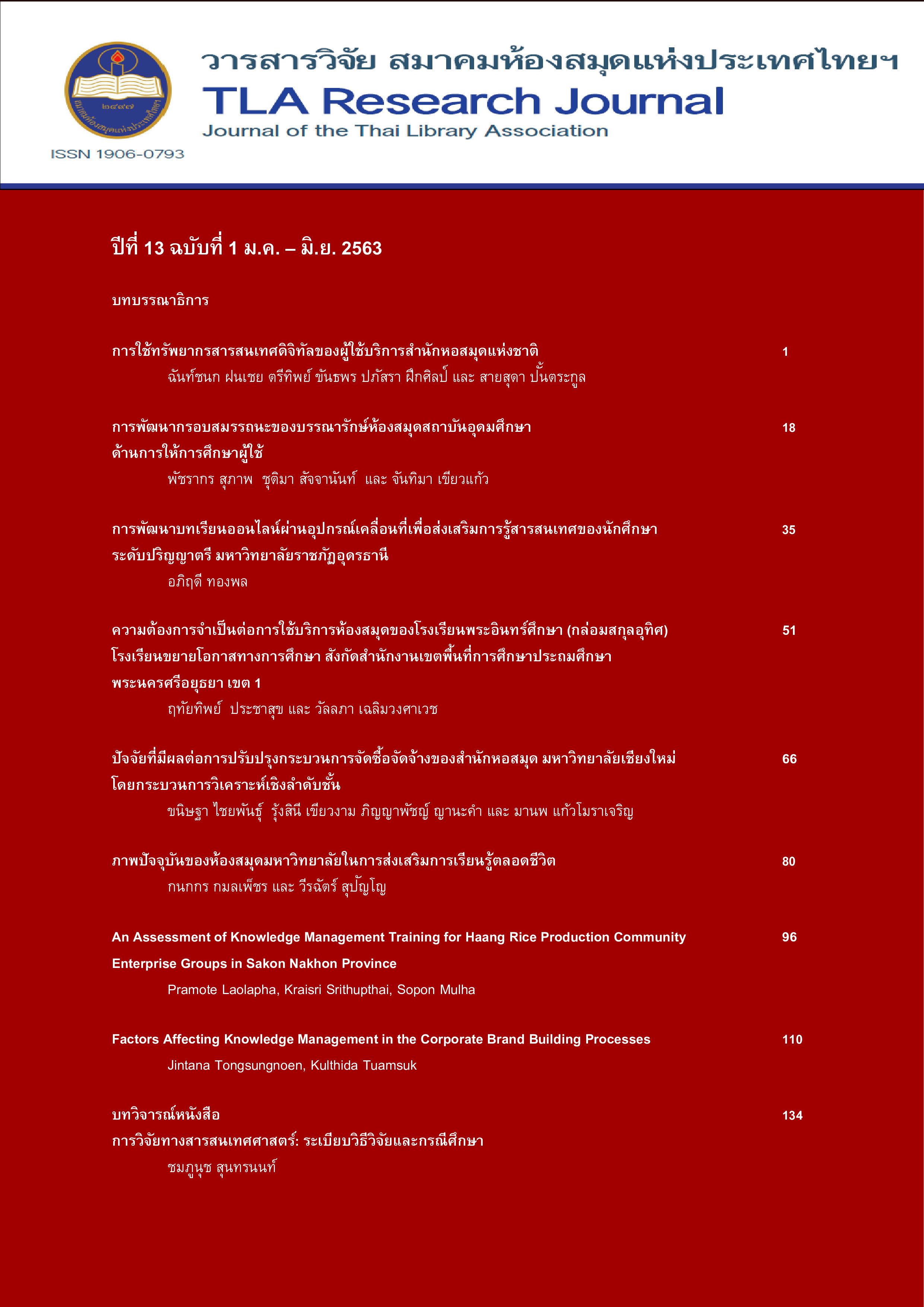An Assessment of Knowledge Management Training for Haang Rice Production Community Enterprise Groups in Sakon Nakhon Province
Main Article Content
Abstract
The objectives of this research were to provide training and to assess results of knowledge
management training for Haang Rice Production Community Enterprise Groups in Sakon Nakhon
province. Two groups of the sample were studied. The quantitative data were analyzed by using
statistical application software to obtain two descriptive statistics namely means and standard
deviations. Meanwhile, the qualitative data were analyzed by using content analysis. The study results
revealed that the overall satisfaction level of the participants toward the training was at a high level (
x = 4.38, S.D. = 0.55). Assessments the output of the training revealed that: 1) For the procedure
aspect, Haang Rice Production Community Enterprise Groups had changed their procedures of
Haang rice production by taking notes of the data and putting more emphasis on sanitation. 2) For the
products aspect, business partnership has taken place between the Haang Rice Production
Community Enterprise Groups and an entrepreneur who ordered Haang rice from the groups on a
monthly basis. 3) For the effects aspect, the groups have invited more villagers to become members,
resulting in an increase in employment, paddy trading, and quantity of Haang rice in the market. 4)
For the sustainability aspect, the groups derived an idea to produce organic Haang rice, which the
market demand tends to increase. They aimed to make their products receive a certificate of Good
Manufacturing Practice, Food and Drug Administration, and Geographical Indication.
Article Details
บทความทุกเรื่องที่ลงตีพิมพ์จะได้รับการตรวจอ่านโดยผู้ทรงคุณวุฒิ ความคิดเห็นและบทความที่ปรากฏในวารสารนี้ เป็นของผู้เขียนซึ่งมิใช่เป็นความคิดเห็นของคณะผู้จัดทำ และมิใช่ความรับผิดชอบของสมาคมห้องสมุดแห่งประเทศไทยฯ การนำบทความในวารสารนี้ไปตีพิมพ์ซ้ำต้องได้รับอนุญาตจากคณะผู้จัดทำ
All articles submitted for publication will be reviewed by the academic reviewers. The editorial board and TLA claim no responsibility for the content or opinions expressed by the authors of individual articles or columns in this journal. Reprinting of any articles in this journal must be permitted by the editorial board.
References
Chantavanich, S. (2010). วิธีการวิจัยเชิงคุณภาพ [Qualitative research methodology]. (18th Rev. ed.). Bangkok: Chulalongkorn University Press. [In Thai]
Horne, C. V., Frayret, J. M. & Poulin, D. (2005). Knowledge management in the forest products
industry: The role of centres of expertise. Computer and Electronics in Agriculture. 47,
167-184.
Office of the National Economic and Social Development Board. (2010). แผนพัฒนำเศรษฐกิจและ
สังคมแห่งชำติ ฉบับที่ 11 พ.ศ. 2555-2559 [The Directions of the Eleventh National Development Plan]. Bangkok: NESDB. [In Thai]
Prasertchai, A. (2011). การจัดการความรู้ การวิจัย และนวัตกรรม [Knowledge management, research and innovation]. Bulletin of School of Health Science Online. Retrieved from http://www.stou.ac.th/Schools/Shs/booklet/book541/km.html [In Thai]
Sakon Nakhon Provincial Agricultural Extension Office. (2011). รายงานข้อมูลวิสาหกิจชุมชนจังหวัดสกลนคร ประจำปี 2554 [Community Enterprise of Sakon Nakhon Annual Report 2011]. Sakon Nakhon: Sakon Nakhon Provincial Agricultural Extension Office. [In Thai
Srisa-ard, B. (2010). การวิจัยเบื้องต้น [Introductions to research]. (8thRev. ed.). Bangkok: Suweeriyasan. [In Thai]
Thangviwutra, P. (2010). แนวคิดและหลักการเกี่ยวกับความรู้และการจัดการความรู้ [Concepts and principles of knowledge and knowledge management]. In เอกสำรกำรสอนชุดวิชำกำรจัดกำรควำมรู้เพื่องำนส่งเสริมกำรเกษตร [Knowledge management for agricultural extension] (pp. 1-1-1-70). Nonthaburi: Sukhothai Thammathirat Open University Press. [In Thai]
The Knowledge Management Institute. (2007). แบบจำลองการจัดการความรู้ในสังคมไทย [Knowledge management model in Thai society]. In สถาบันส่งเสริมการจัดการความรู้เพื่อสังคม (สคส): ตามรอยความสำเร็จ KM ประเทศไทย [The Knowledge Management Institute (KMI): Follow the Success of KM Thailand]. Bangkok: KMI. [In Thai]
Wikipedia. (2014). Knowledge management. Retrieved December 17, 2014, from
http://en.wikipedia.org/wiki/Knowledge_management


